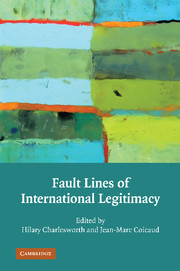Book contents
- Frontmatter
- Contents
- Acknowledgments
- Contributors
- Introduction
- PART I FROM THE HISTORY AND STRUCTURE OF INTERNATIONAL LEGITIMACY TO FAULT LINES IN CONTEMPORARY INTERNATIONAL POLITICS
- PART II THE UN SECURITY COUNCIL: EXPRESSION, VENUE, AND PROMOTER OF INTERNATIONAL LEGITIMACY?
- PART III LEGITIMACY OF INTERNATIONAL INTERVENTIONS AND HIERARCHY OF INTERNATIONAL RIGHTS
- 9 Cosmopolitan Militaries and Cosmopolitan Force
- 10 Sovereignty, Rights, and Armed Intervention: A Dialectical Perspective
- PART IV IN SEARCH OF NEW FORMS OF INTERNATIONAL LEGITIMACY: BETWEEN POWER AND PRINCIPLES
- Conclusion: The Legitimacies of International Law
- Index
- References
10 - Sovereignty, Rights, and Armed Intervention: A Dialectical Perspective
Published online by Cambridge University Press: 06 April 2010
- Frontmatter
- Contents
- Acknowledgments
- Contributors
- Introduction
- PART I FROM THE HISTORY AND STRUCTURE OF INTERNATIONAL LEGITIMACY TO FAULT LINES IN CONTEMPORARY INTERNATIONAL POLITICS
- PART II THE UN SECURITY COUNCIL: EXPRESSION, VENUE, AND PROMOTER OF INTERNATIONAL LEGITIMACY?
- PART III LEGITIMACY OF INTERNATIONAL INTERVENTIONS AND HIERARCHY OF INTERNATIONAL RIGHTS
- 9 Cosmopolitan Militaries and Cosmopolitan Force
- 10 Sovereignty, Rights, and Armed Intervention: A Dialectical Perspective
- PART IV IN SEARCH OF NEW FORMS OF INTERNATIONAL LEGITIMACY: BETWEEN POWER AND PRINCIPLES
- Conclusion: The Legitimacies of International Law
- Index
- References
Summary
Sovereignty as a normative conception is a “distinctive ideal.” It is “about the rights and duties of states and their citizens with respect to the rest of the world.” Historically, the ideal translated from the principle of nonintervention into the internal and external affairs of other states. Today, this principle is in tension with the doctrine of human rights. In the past two decades, ever since the end of the Cold War, “constituted governments [have] unsuccessfully protested that their national sovereignty should shield their abuse of human rights.” Yet, a clear normative consensus is yet to emerge on when sovereignty can be set aside, particularly in favor of armed humanitarian intervention. Indeed, in the case of armed humanitarian intervention, “the normative scene is still rather cloudy, and the extent to which we have moved beyond traditional norms is dubious.” However, the consequences of armed humanitarian intervention are grave, as testified by the Kosovo Declaration of Independence on February 17, 2008. The Declaration inter alia states that the new state is “[g]rateful that in 1999 the world intervened, thereby removing Belgrade's governance over Kosovo and placing Kosovo under United Nations interim administration.” Although this act of Kosovo may not change international relations as we have known them (as President Putin of Russia observed), it is certain to have a critical impact on how the principle of sovereignty will be understood in the future.
- Type
- Chapter
- Information
- Fault Lines of International Legitimacy , pp. 303 - 324Publisher: Cambridge University PressPrint publication year: 2010
References
- 1
- Cited by

